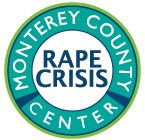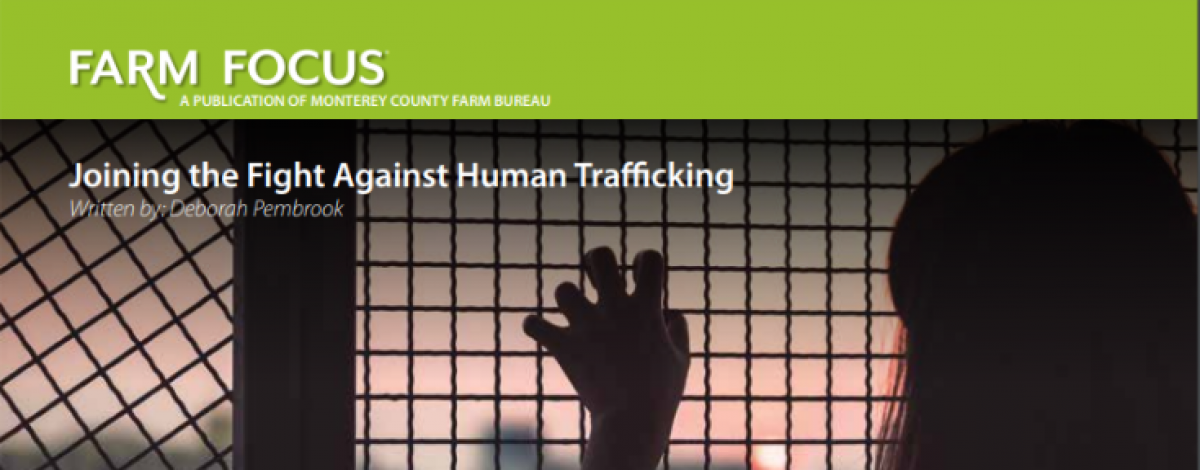Ag Joins the Fight Against Human Trafficking
April 2018
Written by Deborah Pembrook, Outreach Advocate
Everyone has a part to play in ending human trafficking. And as a community that is driven by agriculture, growers and other agricultural business can be a part of the solution. As the growing season takes off, MCRCC is providing human trafficking training, in English and Spanish, to agricultural businesses and organizations like the Growers Shippers Association of Central California to help educate these businesses to identify and respond to human trafficking.
The following article ran in the Spring issue of Farm Focus, the newsletter for Farm Bureau Monterey.
Joining the Fight Against Human Trafficking
Human trafficking happens here, in Monterey County. As members of the agriculture community, you can make a difference in this hidden and difficult issue by taking one or all of the following six steps.
Step One: Learn about Human Trafficking
The most important first step in joining the fight against human trafficking is education. Human trafficking is when someone is forced to work through force, fraud, or coercion - or when a minor is involved in any way with commercial sex. It can take many forms and includes a worker who can’t leave because he has been threatened (coercion) or because she has been tricked (fraud) into believing she has a mounting debt. Human Trafficking can include when an adult thinks she starting a job in a restaurant, but is instead taken to a brothel (fraud) where she is assaulted (force). And any child or teen under 18 involved with commercial sex, the force, fraud and coercion is assumed.
Step Two: Share the Knowledge
There are a lot of myths and misconceptions about human trafficking, but there are also many good local resources for learning more. The Monterey County Rape Crisis Center (MCRCC) provides free training to local organizations. Inviting a speaker to come to your workplace or other gathering to share information about human trafficking in our community can help amplify the message that human trafficking happens here.
Step Three: Know the Hotline
The National Human Trafficking Hotline offers a confidential place to ask questions or report suspected human trafficking. Too often, when people see signs of human trafficking, they don’t know who to call or what to do. Having the National Human Trafficking Hotline in your phone means you have information available when you need it. The National Human Trafficking Hotline is 1-888-373-7888.
Step Four: Hang Posters
Hanging posters that include the National Human Trafficking Hotline in accessible areas has been shown to be the an effective way to reach human trafficking survivors. Restrooms and porta-potties are a particularly effective place to hang these posters. MCRCC has posters available in English and Spanish.
Step Five: Come Into Compliance
For Agricultural Labor Contractors, hanging posters about human trafficking isn’t just a good idea, it is the law. SB 1193 requires specific businesses, including Agricultural Labor Contractors, hotels, and other businesses to display a specific poster about human trafficking in a “conspicuous place near the entrance.” Free posters have been mailed out by the Monterey County District Attorney last January. Additional posters are also available.
Step Six: Join the Fight
Ending human trafficking will take all of us working together. Local businesses and organizations can learn more and partner with others taking a stand against human trafficking by joining the Coalition To End Human Trafficking in Santa Cruz and Monterey Counties. (CoalitionToEndHumanTrafficking.org)
The agricultural community is in a powerful position to respond to human trafficking here in Monterey County.
Deborah Pembrook is an Outreach Advocate for Monterey County Rape Crisis Center, a local organizations that serves survivors of sexual assault, child abuse and human trafficking in Monterey County. For more information about our training, free posters or assistance, contact us at 831-771-0411. To talk with a local advocate on our 24-hour, confidential crisis line call 831-375-4327 or 831-424-4357. To learn more visit mtryrapecrisis.org.
To report human trafficking, call the National Human Trafficking Hotline at 1-888-373-7888.

